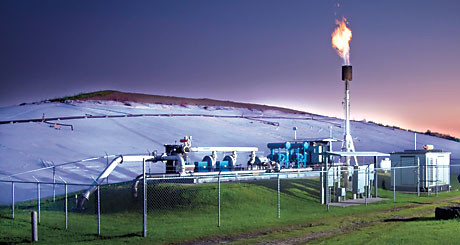SHARE:
Carbon Credits
Swapping Carbon
Florida businesses dabble in voluntary carbon-trading markets.
 New River Regional Landfill earns credits for destroying the methane it produces. |
Government Carbon Traders
TRASH TO CASH: In Florida, the early players in the voluntary carbon markets include the New River Regional Landfill in rural northeast Florida, a joint project of Baker, Bradford and Union counties. New River is a bioreactor landfill, which means it uses liquid and air to speed up the decomposition of organic waste. The process creates an enormous amount of methane, a greenhouse gas 20 times more polluting than carbon dioxide.
Officials at New River, which burns off the methane, saw how selling carbon credits might help them turn their 65 acres of trash into cash. New River joined both Chicago Climate Exchange and the Climate Action Reserve, a California-based market. New River is working with Climate Action Reserve on future credits, which the governments that run the landfill hope will generate enough revenue to build a landfill gas-to-energy system. The Chicago Climate Exchange, meanwhile, certified the landfill for about 200,000 credits — each represents one ton of carbon — for methane it already destroyed.
BUREAUCRATIC CARBON:
 Natacha Seijas |
Miami-Dade County got into carbon-trading in 2007, after County Commissioner Natacha Seijas convinced her fellow board members that the county should show leadership on climate change, given Miami’s vulnerability to sea-level rise. The county signed on with the Chicago Climate Exchange, paying $5,000 in annual dues (a lower fee for government; private companies report paying annual dues of $20,000). Because the county failed to meet its target carbon reductions, it will pay another $122,850 this fiscal year to offset some 70,000 tons of carbon.
The funds will come from departments that failed to meet their carbon-reduction goals. Seijas acknowledges the expense is painful during a budget crisis that has resulted in hundreds of worker layoffs. But she says the carbon market has provided the incentive that department directors needed to cut fuel and other expenses. For example, the county reduced fuel-related carbon emissions by 6,000 tons between 2007, when it joined the exchange, and 2008. The transit department slashed its unleaded fuel consumption by 71,000 gallons and its diesel use by 687,000, in part because of efficiency moves such as an anti-idling policy and in part because of the economic downturn.
"We can’t always think about short-term savings," she says. "This is an investment being made in the future."























